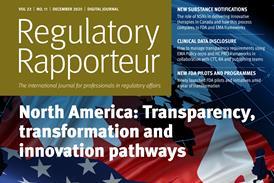Although the pandemic is not over yet, as we move forward, we must embrace these advances and not return to ‘business as usual’ despite the challenges such ways of working entail
As we all turn the page on our calendars to a new year, it is traditional to look back on the year that was for some ‘lessons learned’ and look forward to the year that lies ahead and identify what we ‘resolve’ to do better in 2022. This is the primary focus of this month’s issue of Regulatory Rapporteur.
Over the past two years, the clinical research community has shown that it can rise to the challenge of a global pandemic and engage with partners and collaborators to test and develop vaccines and treatments that the world desperately needed. It has also shown how the community can adapt quickly when needed to keep trials going despite lockdowns and burnout. No issue on clinical trials during these times would be complete without acknowledging the resilience and dedication to public service of every group involved from the trial participants, to the study teams and to the regulatory authorities.
As Dr Wendi Lau notes in her article, the clinical trial community was catapulted into using aspects of the decentralised clinical trial (DCT) model as the COVID-19 pandemic took hold. This gave the impetus to recognise the potential of DCTs to increase patient engagement and diversity through the adoption of these elements. Although the pandemic is not over yet, as we move forward, we must embrace these advances and not return to ‘business as usual’ despite the challenges such ways of working entail.
While the advantages of bringing clinical trials to the patients has emerged as a positive from the pandemic, Aman Khera and Sarah Bly describe how the clinical trials for vaccines and COVID-19 treatments have highlighted the problems that have existed within clinical research for years in terms of how we recruit and treat patients from historically marginalised communities. Again, we need to resolve to do better as an industry to facilitate and promote diversity in clinical trials.
Our interview this month with Dave Evans, current President and CEO of the Clinical Data Interchange Standards Consortium (CDISC), discusses the data we collect from our clinical trials and how “data are oft en collected in a variety of formats, leading to difficulties to effectively share and compare it”. You can read how CDISC intends to play an increasingly important role in information as it is used for regulatory submissions and realworld data analysis as the organisation and our sector look to the future.
Our final focus article considers the implementation of the EU Clinical Trial Regulation (EU CTR) and the Clinical Trial Information System (CTIS) in 2022, which will enable harmonised clinical trial submissions and coordinated assessment of studies that will promote patient safety and increase transparency. This issue also includes articles on the regulatory challenges facing substance-based medical devices; antidrug antibody (ADA) evaluation in toxicology studies; the requirements for good distribution practice of medicines; and a meeting report on the use of big data in veterinary regulatory affairs.


































